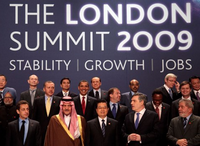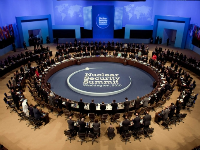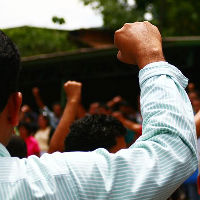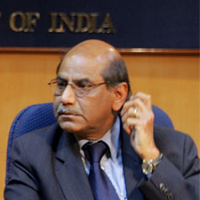The plight of migrant workers around the world got significant attention from rights advocates this week ahead of International Labor Day on May 1. Across the globe, according to advocates, migrant workers face a broad range of serious human rights abuses that range from unpaid wages and long working hours, to sexual abuse and murder. Hundreds of thousands of migrant domestic workers continue to face abuse in Asia and the Middle East despite moves by several governments to reform legislation and provide better training for law enforcement, Human Rights Watch charged in a new report. Most of the domestic workers, […]
Global Archive
Free Newsletter

When the finance ministers of the G-20 nations met on the sidelines of the annual IMF-World Bank meetings in Washington last weekend, it marked the sixth time they had convened since the fall of 2008. When the G-20 leaders meet this summer in Toronto, the total number of summits held since the global financial crisis erupted will hit double digits. And yet, despite early cooperation that addressed the global liquidity shortfall, little substantial progress has been made in the area of international financial regulation. Given the trauma that the entire world economy has suffered, in part due to a lack […]
The Interpreter has published a very powerful and moving letter from a reader and Afghanistan war veteran that’s really worth reading. Along with this post by Robert Farley, it serves as a junction between what had been two parallel threads I’ve been following on the myth of “antiseptic war.” One, to which the reader was responding, has to do with the relation between video games and networked war, which Sam Roggeveen discussed here. The other has to do with COIN and population-centric warfare, and specifically the misconception of it as a “kinder and gentler” form of war, which Michael Cohen […]
Announcements by New Zealand and the United States this week on the United Nations Declaration on the Rights of Indigenous Peoples moved the world community tantalizingly close to achieving consensus on a human rights issue with ongoing relevance in many parts of the world. The declaration protects indigenous rights related to land, resources, cultural identity, education and others issues. Only four countries — Australia, Canada, New Zealand and the United States — opposed it when the U.N. General Assembly originally voted on it in 2007. Australia dropped its opposition to the instrument last year. On Monday, New Zealand said it […]
No matter where you stand on nuclear abolition, if it’s an issue you care about, you ought to read through Bruno Tertrais’ article (.pdf) in The Washington Quarterly, “The Illogic of Zero.” As the title indicates, it’s a critique of total nuclear disarmament, and some of it is ground that Thomas P.M. Barnett covered in his last couple WPR columns (especially here, but also here). But in addition to offering a number of solid arguments against implementing “zero” as policy, Tertrais also offers a section full of substantive arguments against adopting it even as a vision. What also makes the […]
In a talk at the Carnegie Council earlier this month, Georgetown University professor of international relations Charles Kupchan walked attendees through the findings of his latest book, “How Enemies Become Friends.” The cross-cultural study spans centuries and examines the normalization process by which bitter enemies can develop friendly relations. The hope is that by analyzing past successes and failures, we might be able to identify the key elements necessary to orchestrate the right conditions for peacemaking. Although the unification of the Swiss Cantons, the normalization of U.S.-British relations, the formation of the Iroquois Confederation in upstate New York and the […]
A few days after posting this about the impact of COIN on armor, I ran across this Gian Gentile piece over at Small Wars Journal, basically arguing that the U.S. Armor Corps is dying a slow death by negligence. That spawned an Internet-wide debate that SWJ collected here. I’d add Paul McLeary’s Ares post on the subject as well. In the meantime, it looks like China and Turkey are two other places where the job prospects for tank commanders are bright. The fact that China still place such a heavy doctrinal emphasis on armor is certain to embolden the COIN-skeptic […]
It seems like a “given” that the freedom from torture is a right guaranteed by all democratic societies in the 21st century. But the reality is that over the past decade, in many democratic countries, including Pakistan and the United States, authorities have turned a blind eye, or in some cases openly endorsed torture, when politically expedient. So the news that the Indian cabinet has signed off on handing over the country’s first anti-torture legislation to the parliament for a vote should spark cheers, right? Not exactly. The Prevention of Torture Bill 2010 was drafted without public discussion, and no […]

Now that the Nuclear Security Summit will become a recurring event, with the next one scheduled for 2012 in Seoul, national governments will need to integrate this new mechanism with the existing major multinational efforts designed to counter nuclear terrorism. Despite differences in membership, emphasis, and other dimensions, three prominent initiatives directly support the summit’s objective of enhancing international cooperation to prevent nuclear terrorism: the Global Partnership against the Spread of Weapons and Mass Destruction, United Nations Security Council Resolution 1540, and the Global Initiative to Combat Nuclear Terrorism. Last week’s summit documents endorsed their activities, without specifying how the […]

Introduction International support is capable of making the difference between the successful defense of democracy and its ignominious defeat. Indeed, the perceived probability of both support for democratically chosen leaders and opposition to their attackers can fundamentally shift the balance in the domestic struggle between them. Nevertheless, although changes to international law and international relations justify a greater international role in preventing and deterring coups and erosions, not all responsibility for protecting democracy should be assigned to the international community. Indeed, the first line of defense should be a democracy’s own domestic initiatives, with the main role of the international […]

Most people look back upon the 20th century as the deadliest in human history, with scholarly estimates suggesting that close to 200 million people died in all the wars, revolutions, genocides and totalitarian purges of those bloody decades. As a result, we regard the entire century as the age of total war, even though we have not experienced great-power war since 1945. Even more telling, state-based war almost completely disappeared as the century drew to a close, leaving us with primarily civil strife, failed states, and the transnational bad actors they both spawn. But instead of celebrating the peaking and […]
Walter Russell Mead has some typically thoughtful things to say on the persistence of American power and influence. But if Mead is right that this week’s Nuclear Security Summit is an illustration of the ways in which America still sets the global agenda, it seems that he might not have paid as close attention to the BRIC and IBSA summits that followed it. In addition to both summits articulating alternatives to the Obama administration’s Iran policy, the BRIC summit also produced a joint declaration setting a 2010 deadline for reforming the IMF and World Bank to better reflect the shifting […]

NEW DELHI — Emerging differences within the Indian government regarding whether to adopt a more flexible approach to climate change negotiationscame to a boil recently, when the prime minister’s special envoy on climate change, Shyam Saran, quit his post. Until now, Saran — who has been leading India’s negotiations at international forums, including Copenhagen — opposed efforts by Environment Minister Jairam Ramesh to soften India’s line on climate change methodology. Indian media have been highlighting the disagreements between Ramesh and Saran, which center around Ramesh’s attempts to update India’s basic principle of per capita emissions norms to define burden-sharing between […]
A couple scattershot thoughts on President Barack Obama’s nuclear nonproliferation agenda in the aftermath of this week’s Nuclear Security Summit: First of all, in combination, there’s no question that the follow-on START treaty, the Nuclear Posture Review and the nuke summit in Washington represent significant, if incremental, successes. From a political optics perspective, Obama achieved a high-priority agenda item, left his mark on a legacy item and demonstrated well-regarded global leadership, in that order. Anyone who doubts the potency of that sequence needs to check their head with a geiger counter. This was a good couple weeks for the president, […]

The firestorm of controversy battering the Catholic Church shows no sign of dying down, as the institution and its leaders continue to endure scorching new accusations of pedophile priests abusing young children, and of Vatican officials covering up their actions. Amid all the fury, the Vatican made a bold move: In a reversal of a decades-old pronouncement, the church forgave the Beatles for having deemed themselves more popular than Jesus. Reading praise of the Beatles’ music in the church’s official L’Osservatore Romano, one could almost hear the sound of the Vatican fiddling as it burned. Perhaps the piece by Vallini […]
Jim Lehrer speaks to Under Secretary for Arms Control and International Security Ellen Tauscher about Iran, China and the Nuclear Summit. Tauscher talks about the progress President Obama has made in his efforts to persuade countries attending the summit to better secure their nuclear stockpiles. She says that not only has Obama recieved a committment from attendees to better secure their nuclear material, but the group as also committed to reconvene in 2012 in South Korea to continue to tackle the issue. Having trouble viewing this video? Click here to watch.
